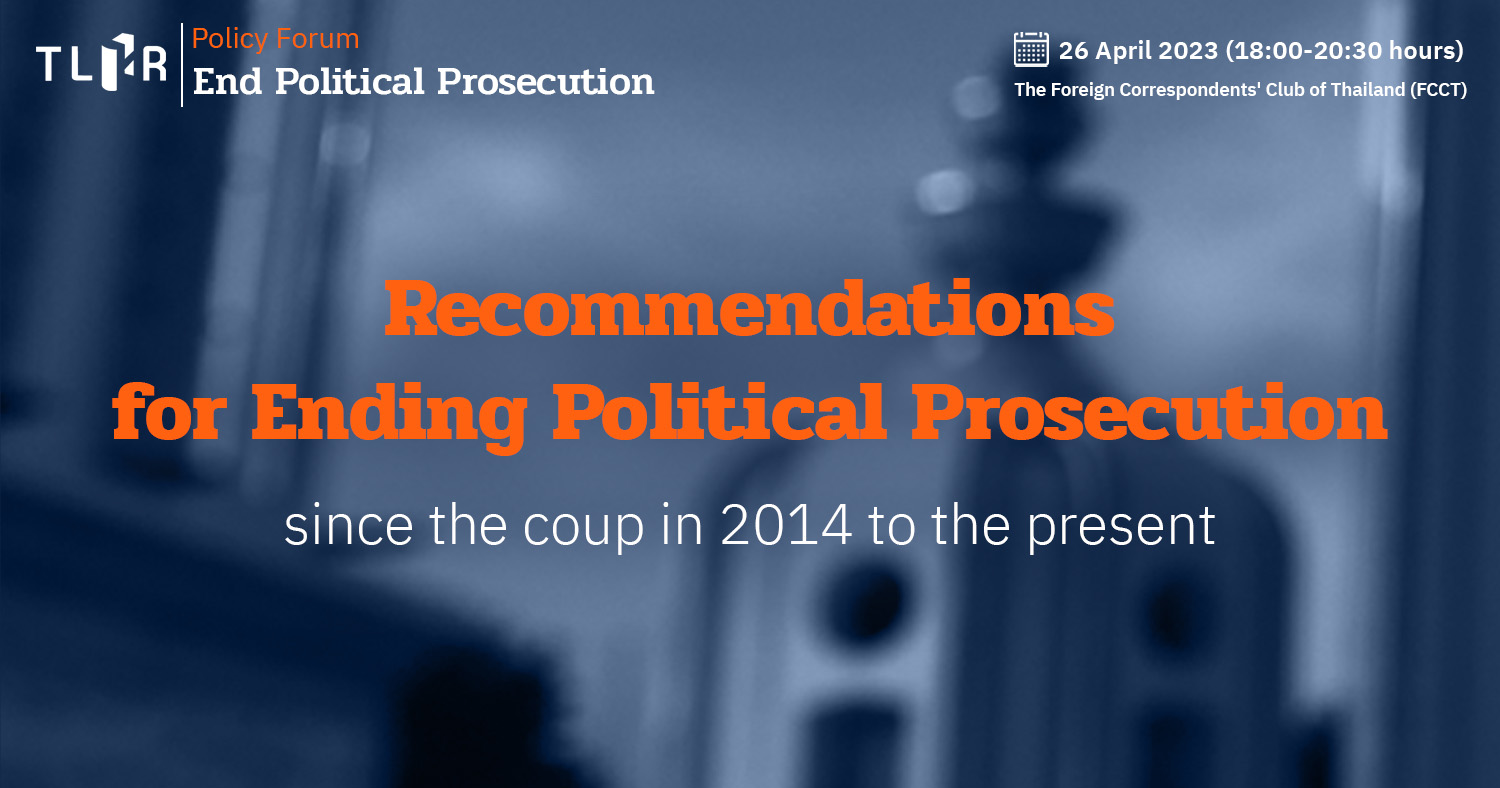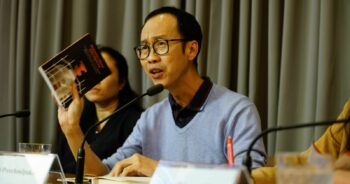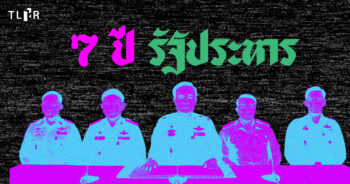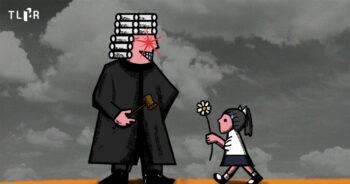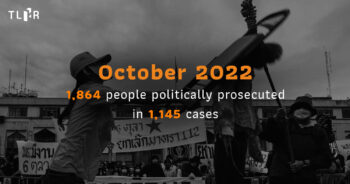Thai Lawyers for Human Rights
26 April 2023
Introduction
Thailand’s longstanding political conflict is the result of an imbalanced management of power relations and structure among the state, the people, and various interest groups. This has inevitably affected the country’s political stability and allowed certain actors to resort to an undemocratic means to seize power. The most recent case of such an event, the coup d’état led by the National Council for Peace and Order (NCPO) on 22 May 2014, caused severe damages to Thailand’s rule of law and democracy. Under Section 44 of the interim Constitution 2014, NCPO was granted a total and expansive control of the legislature, executive, and judiciary. The provision became a key instrument to control and suppress the people, including the prosecution of more than 2,400 civilians in the military court.
The enactment of the 2017 Constitution and the first general election in March 2019 did nothing to mitigate or solve the existing political conflict. On the contrary, they served to secure the grip of the NCPO and army, especially by empowering the senators, who were appointed by the coup government, to elect a prime minister.
Another wave of conflicts took shape after the election and the ruling by the Constitutional Court dissolving the Future Forward Party in February 2020. In the context of the Covid-19 pandemic, the government declared a state of emergency purportedly to curb the spread of the disease. It, however, was largely used to control gatherings and political assemblies.
The Free Youth protests in July 2020 marked the official beginning of the newly emerged political movement, which consists of various activist groups, such as Ratsadon, Bad Students, Feminist Liberation, Free Gender, United Front of Thammasat and Demonstration, Thalu Fah, Thalu Gas, Thalu Wang, Moke Luang Rim Nam, and so on. Within the course of two to three years, more than 1,800 citizens have been subjected to politically-motivated prosecution and charged under various laws. While the most common charge is the violation of the Emergency Decree on Public Administration in Emergency Situation, the most contentious offense, which also is part of the demand for royal reforms, is lèse majesté, or Section 112 of the Criminal Code.
Thai Lawyers for Human Rights was founded after the coup d’état with the mission to provide legal assistance to those affected by the abuse of power by the coup government. Today, it also assists cases related to freedom of political expression. We see the 2023 election as a renewed hope for addressing the political conflict and coup legacy, and gradually restoring democracy in the country. Thus, Thai Lawyers for Human Rights presents these recommendations for political parties to adopt in order to end political prosecution arising after the 2014 coup until today and, eventually, pave a way to the solution of political conflicts and democratization in the country.
The situation of political prosecution from 2014 – 2019
- Prosecution of civilians in the military court and Court of Justice
Following the coup, the National Council for Peace and Order (NCPO) issued the NCPO Order no. 37/57, 38/57, and 50/57, requiring civilians to go on trial before the military court for offenses related to violation of the NCPO announcements and orders, national security offenses, lèse majesté, and the possession and use of firearms and explosives that were designed specifically for war and for which no license could be issued. Consequently, more than 2,400 people were tried by the military court. As the cases occurred during the enforcement of the martial law between 20 May 2014 and 31 March 2015, the defendants were unable to exercise the right to appeal, contradictory to the principle that decisions by lower courts must be reviewable by a higher court.
The prosecution of civilians in the military court denies the people of their right to a fair trial. The military court is under the Ministry of Defense. Its panel of judges consists of judges who are trained in military law and justice and never underwent general legal education. They do not have adequate expertise in the law itself. This is not in line with the principle of judicial independence and impartiality.
Apart from the abovementioned practice, various obstacles in the military court were indicative of an inferior standard of trials when compared to those in the Court of Justice. Issues included, for instance, the notification of examination appointments to lawyers, photocopy requests, the absence of a system for court-appointed lawyers, the lack of a body tasked with investigating defendants’ behaviors to support trials, discontinuous trial dates, and the excessive lèse-majesté sentences, which were almost twice as high as those given by the Court of Justice.
Despite the NCPO Order no. 55/2559 issued on 12 September 2016 lifting the mandate of the military court to try civilian cases and NCPO Order no. 9/2562 transferring the cases to the Court of Justice, several cases were still not concluded. Even when the proceedings had ended, the right to a fair trial of more than 2,400 civilians had already been violated.
2.Harassment of people with Section 44, the martial law, and extrajudicial means
In addition to the prosecution of civilians in the military court, the NCPO relied on the martial law (effective 20 May 2014 – 31 March 2015) and orders issued under Section 44 of the 2014 Interim Constitution to detain people without charges, visit politically active people at their residences or private properties, harass and stifle activities, summons people, and, without any legal bases, force people to sign a memorandum of understanding to halt their political movement. TLHR found that, during the NCPO regime,
(1) at least 1,501 people were summonsed, detained at military barracks, and surveilled at their houses;
(2) at least 353 activities were banned or interfered with;
(3) in at least 55 instances, the NBTC censored and controlled media’s function and, relying on the NCPO announcements/orders and Section 37 of the Operation of the Sound Broadcasting Service and the Television Broadcasting Service Act B.E. 2551 (2008), punished the media for reporting on political issues;
(4) at least 155 community/villagers groups and/or civil society organizations have had their community rights and the right to freedom of expression restricted. Suppressed issues included the environment, forest, land, river, mining, power plants, health, labor, and other public policies;
(5) at least 18 instances of torture during detention by the military under the martial law, NCPO orders, or Head of NCPO’s orders; and
(6) at least 33 instances of detention of civilians in the military prison.
Moreover, the use of both legal and extralegal measures has also led at least 100 Thais to flee the country.
Problems with political prosecution between 2020 – 2023
Although political demonstrations were on decline following the 2019 election, the dissolution of the Future Forward Party in February 2020 drove university students all over the country to take to the street. Their protests eventually calmed down due to the emergence of the Covid-19 pandemic in March 2020.
The protests resurfaced again as the 10th anniversary of the May 2010 incident approached and news of the disappearance of Wanchalerm Satsaksit, a Thai political exile in Cambodia, was made public. This wave of protests continued throughout mid-2020 and, for the first time, observed open discussions on the topic of the monarchy. In an interview, Prayut Chan-o-cha said, “Please realize why there has been no prosecution under Section 112. Why are people taking advantage of this situation? He [the King] is kind and gracious. He has stressed this to me himself in the past 2 – 3 years. Can’t you see why Section 112 has not been used? You are crossing the line. Everyone who loves the nation, religion, and the monarchy must join hands.” This statement was made to ensure that the protests did not touch upon the monarchy.
With the mass demonstration of the “Free Youth” group at the Democracy Monument on 18 July 2020 and the mass demonstration on 19 September 2020 at Sanam Luang, a loose organization of an activist group called “Ratsadon” was formed in the second half of 2020. Despite the presence of diverse activist groups protesting simultaneously, the protesters all shared the main demands of the Ratsadon group: 1. Prayut Chan-o-cha’s resignation; 2. constitutional amendments; and 3. reforms of the monarchy.
On 14 October 2020, the protest rally to the House of Government crossed paths with the royal motorcade, prompting the government to disperse the protest and declare a severe state of emergency in the Bangkok area from 15 October 2020 to 22 October 2020.
In November 2020, Gen. Prayut Chan-o-cha declared that all sections of the law would be enforced, implying that the use of Section 112 of the Criminal Code, or the lèse-majesté law, would be resumed. A few years prior to this, the government had been implementing a policy under which it did not use Section 112 to directly accuse or punish the citizens. Rather, it usually resorted to Section 116 (sedition) to prosecute monarchy-related content. Now, however, the police are back to using Section 112 to prosecute such content.
The wave of protests continued at a steady pace in 2021 against the backdrop of arrests and prosecution of activists under various charges. This year also saw the justice system being (mis)used to prosecute and harass activists, activists bails being denied, activists being detained for a period of time before release, and stricter conditions for bail, as well as the Electronic Monitoring (EM) devices and curfews, being imposed. In August of the same year, the Thalu Gas group staged protests daily, which were often dispersed with force.
In 2022, the Thalu Wang group was formed and launched its activities by conducting polls to survey public opinions on royal motorcades and other monarchy-related issues. Today, as the country is gearing towards a general election in 2023, political activism is still ongoing, while the number of people facing political prosecution has reached an all-time high.
Statistics related to political protests and expression
1. Overall statistics
According to TLHR, at least 1,898 people in 1,196 cases have been charged and/or prosecuted due to political participation and expression since the beginning of the “Free Youth” protest on 18 July 2020 until 18 April 2023. Among this number are 213 cases involving 284 children and youths under 18 years old, including 41 under 15 years old and 243 between 15 – 18 years old.
- At least 239 individuals in 258 cases have been charged under the lèse-majesté law;
- At least 130 individuals in 41 cases have been charged with the “sedition” offense under Section 116 of the Criminal Code;
- At least 1,469 people in 663 cases were charged with violation of the Emergency Decree (since May 2020 when the first prosecution against protesters and activists was initiated);
- At least 137 people in 78 cases have been charged with offenses under the Public Assembly Act;
- At least 166 people in 185 cases have been charged with offenses under the Computer Crime Act;
- At least 36 people in 20 cases have been charged with contempt of court and at least 28 people in 9 cases have been charged with insult of court.
2. Cases against children and youth
Since 2020, a total of at least 284 youths have been charged and/or prosecuted for political participation and protests. This marks the first time in Thai political history where hundreds of young people are subjected to politically-motivated charges/prosecution. After a series of leaderless protests at Din Daeng Intersection from 2 August 2021 to the end of October 2021, at least 210 youths, who later called themselves Thalu Gas, were arrested on-site and later prosecuted afterwards, resulting in 104 cases. At least 18 youths in 21 cases have been charged and/or prosecuted with the lèse-majesté law or Section 112 of the Criminal Code.
Cases involving youths are more complicated than those involving adults due to different court procedures. In cases involving children and youth, the best interest of the child must be the primary consideration according to the Convention on the Rights of the Child (1969). TLHR has found that in examining the arrests in children cases, the court merely checked whether the detention period prior to the child being brought to the court exceeded 24 hours. However, it did not appear that the court examined whether the arrests were conducted gently, taking into account human dignity of the child, as required by Section 69 of the Juvenile and Family Court and Procedure Act B.E. 2553 (2010). The use of special measures in lieu of a criminal proceeding or diversion measure also puts the accused or defendant, who is a child, in a situation where they must confess in order to be eligible for such measures. Such measures have been designed to accommodate children and youth who committed crimes and may not be suitable for cases involving those who express political opinions or criticisms.
Furthermore, the Central Juvenile and Family Court has issued arrest warrants for more than 30 children and youth for various charges. In the most recent case, ‘Yok’, a 14-year-old girl (at the time of the alleged offense) charged with royal defamation as a result of her expression at a protest in front of the Giant Swing Plaza on 13 October 2022, is being detained during investigation at Ban Pranee Juvenile Vocational Training Center for Girls. She refused to participate in the judicial process.
3.Cases of violation of the Emergency Decree
From the announcement of a state of emergency on 26 March 2020 until its revocation on 30 September 2022, at least 1,469 people were prosecuted in 663 cases for its violation as a result of their participation in protests. 138 of these cases have been concluded. Meaning, more than 525 cases are still ongoing, which can be broken down into:
- 299 cases in the investigation stage
- 143 cases at the Court of First Instance
- 79 cases at appeal or deciding whether to appeal
- 4 cases at the Supreme Court or deciding whether to appeal to the Supreme Court
- As for the concluded cases, 40 cases were not indicted by public prosecutors.
As for the cases where the defendants pleaded not guilty, the courts acquitted the defendants in 63 of them. In many cases, the courts reasoned that the protests were an exercise of the rights and freedoms under the Constitution and took place in an open space with good ventilation, that the protesters practiced social distancing and preventive measures, and that there was no spread of the disease at the protests.
In at least 31 cases, the courts handed down a guilty verdict (the verdict in two of these cases were overturned by the Appeal Court). As far as the punishment goes, the courts imposed the sentence of fine in 14 cases, suspended the punishment in one case, and imposed the sentence of imprisonment in 16 cases. Most of the cases with the imprisonment sentence were given suspended sentences.
Violation of the Emergency Decree is the most common offense, as the economic, health, and political conditions during that time had driven a large number of people onto the street. More than 1,469 people have been charged and/or prosecuted. Although the Emergency Decree has now been revoked and more cases have been acquitted than convicted, the remaining cases still have to go on trial first, thereby wasting time and resources without actual benefits to the public.
4.Lèse-majesté cases
The enforcement of the lèse-majesté law or Section 112 of the Criminal Code varies according to the political environment at a given time. A number of people were already prosecuted with this law prior to the 2014 coup d’état, especially in 2010, and were mostly sentenced to 5-year jail terms for each count of the offense. After the 2014 coup, Section 112 was embedded in the NCPO’s suppression policy, resulting in more than 169 cases. Section 112 cases during this period were tried by the military court, which imposed heavier punishment than the Court of Justice (8 to 10 years of jail term per count).
In the period between 2018 and 2020, there was a surprising policy against the enforcement of Section 112, which led a number of cases to be dropped, dismissed, or convicted under other offenses. This hiatus, however, ended at the end of 2020. In the course of over 2 years from November 2020 to 10 April 2023, at least 239 people were found to have been accused of this law in 258 cases. The majority of the cases, 137 cases or 53%, concerned online expression, followed by 48 cases of public speeches at the protests.
The Court of First Instance has already issued verdicts in 52 cases, including 33 cases where the defendants decided to plead not guilty and 19 cases where the defendants confessed to the crime. The verdicts can be summarized as follows:
- The courts acquitted the defendants in 11 cases
- The courts dismissed the charge of Section 112 but passed sentences under other charges without suspension in 3 cases
- The courts passed the sentence of imprisonment without suspension in 25 cases
- The defendants confessed and the courts suspended the prison sentence in 11 cases
- The defendants confessed and the courts suspended the determination of punishment in 2 cases
Thai Lawyers for Human Rights makes the following observations on the use of the lèse-majesté law since November 2020:
- Section 112 concerns an offense against the nation, thus allowing private individuals to file a complaint against other people, even if they are not the victims. As such, complaints have been filed by both people who have different political opinions as well as government agencies. Of all the cases, 112 cases were filed by private individuals, 11 by the Ministry of Digital Economy and Society, 9 cases by the executive assistant to the Prime Minister’s Office, and 1 case by an administrative officer. The remaining cases were filed by police officers.
- In most cases after 2020, the accused were granted bail during trial, with the exception of leaders or key activists, who had to undergo cycles of being arrested, denied bail, and granted bail several times. Some activists were subjected to house arrest. These incidents led many activists to perform hunger strikes and refuse sleep as a form of protest, and eventually caused a severe lack of faith and trust in the justice system.
Currently, there are 2 people in lèse-majesté cases still under detention, including Wut, who is being prosecuted at the Minburi Criminal Court for posting 12 statements on Facebook, and Yok, a 15-year-old child who rejects the justice process. Meanwhile, there are at least 3 people whose cases have been concluded and who are serving their sentence in prison.
(3) The screening of cases by public prosecutors. According to TLHR statistics, 184 cases have been forwarded to the court by public prosecutors. As far as we know, there is not a single case that was not indicted by the prosecutor, except the lèse-majesté case of Intira ‘Sai’ Charoenpura who participated in a protest in front of the 1st Infantry Regiment on 29 November 2020. However, like other activists accused of both Section 116 and lèse majesté, Sai was still prosecuted under Section 116. Hence, it can be said that the public prosecutors issue an indictment order in almost all lèse-majesté cases.
(4) That the court broadly interprets the law poses another problem with lèse-majesté cases. Although criminal cases require that statutory interpretation be performed strictly and not broadly due to the punitive nature of criminal law, this principle does not hold true in many lèse-majesté cases. Examples include Jarat’s case where the Appeal Court interpreted the offense to also protect former kings, the case involving the defendant who pasted stickers on a royal portrait, the case of Sombat Thongyoi who posted “very brave, very good, thank you” on Facebook, and the case of Thanakorn ‘Petch’ where the Juvenile and Family Court interpreted the law to include all kings.
(5) The penalty for the offense is excessive when compared to the conduct underlying the offense. The penalty for Section 112 is imprisonment of 3 – 15 years, while there is no minimum prison sentence and only imprisonment of not exceeding 1 year for the offense of ordinary defamation of another person, and imprisonment of not exceeding 2 years for defamation by advertisement. It can be seen that the penalty for these 3 offenses differs significantly and that, considering the fact that the 3 offenses prohibit very similar underlying conduct, the penalty for the lèse-majesté offense is disproportionate. Moreover, Section 112 contains no exemption or waiver clause and does not distinguish between an insult, defamation, and threat, unlike the law on defamation of another person. It is important to note that the said penalty is the result of the amendment of the law by the order of the coup makers following the 6 October 1976 incident.
Under the current situation, it is found that the courts have been handing out a prison sentence of between 3 – 5 years per count, the majority (25 cases) receiving 3 years per count, the lowest permitted by the law. The case with the highest penalty since 2020 is that of Mongkhon Thirakot, who was sentenced to a jail term of 28 years for a total of 14 statements deemed illegal by Chiang Rai Court.
As is observed, the punishment for Section 112 varies with the political situation. Prior to the 2014 coup d’état, the Court of Justice passed a sentence of imprisonment of 5 years per count on average, whereas, after the coup, the military court preferred 8- to 10-year jail term. Today, the average length of the imprisonment sentence is 3 years per count, which is the lowest possible. This means that, should the court find the offense not serious, it is prevented from handing out a lighter sentence.
(6) Section 112 is not in line with the freedom of expression protected by Article 19 of the International Covenant on Civil and Political Rights. The United Nations human rights mechanisms have shared their opinions on this offense with the Thai government multiple times, explaining that the law is overbroad and excessive, the arrest thereunder is arbitrary, and “Section 112 of the Criminal Code has no place in a democratic country”.
(7) Section 112 is highly politicized and has become a political tool to harass opponents. This is evident from the fact that the enforcement of this single provision entails so much difference in terms of the decision to bail, the number of cases, punishment, and court with jurisdiction. The enforcement also depends on the period and political situation at the time. No other offense is as unpredictable and uncertain as the lèse-majesté offense. At the same time, such an intense and extensive use and interpretation could also damage the monarchy itself.
If no action is taken politically or legally, all cases are poised to reach the court and likely many more people will be detained for their political participation.
Politically-motivated cases
Thailand has promulgated 23 amnesty laws, 11 of which granted pardon to the coup makers, 6 to the rebel cases, 3 to protest cases, and 3 to others. All amnesties given were intended to solve political problems. Nevertheless, after the 2014 coup, the NCPO used its power in a way that widely and consistently undermined people’s rights and freedoms for over 8 years. The affected people also faced the use of political tools in the form of laws and prosecution. If these prosecutions are not terminated, it would be difficult to solve this deep-rooted political problem in Thailand. Ending political prosecution is part of an initial solution to mitigate the conflict and restore justice to the people. Thus, Thai Lawyers for Human Rights proposes the following recommendations for ending political prosecution since the 2014 coup until the present, so that they could serve as a good basis for further discussions and long-term solutions.
Recommendations for solving and ending political prosecution since the 2014 coup d’état until the present
(1) Enact a law to end the prosecution of civilians in the military court and political or politically-motivated cases arising after the coup d’état on 22 May 2014 until today.
1.1 The parliament should enact a law authorizing and empowering the committee on political trials to decide which case is political and which one is politically motivated.
1.2 The House of Representatives should formulate broad criteria for considering political and politically-motivated cases and make sure that members of the committee on political trials consist of all stakeholders, including MPs, victims’ representatives, agencies in the justice system, academics, and human rights organizations, with gender diversity and gender balance in mind. The committee on political trials must be independent and impartial.
A political case means a case where the offense or event on the date of incident can be identified, for example, cases related to NCPO announcements and orders, civilians’ cases in the military court, lèse-majesté cases, etc.
A politically-motivated case is a case that cannot be characterized as a political case or where it is not possible to identify the event on the date of incident, but whose motivation can be proven to be political.
1.3 The parliament should enact a law ending political prosecution and politically-motivated cases since the 2014 coup d’état until the present and nullifying the culpability in those cases, effectively terminating them.
1.4 The parliament should enact a law allowing civilians involved in non-political or politically-motivated cases and/or civilians who were tried by the military court to request a re-trial in the Court of Justice or allowing civilians involved in the cases happening during the martial law to exercise the right to appeal.
(2) Establish an independent commission of inquiry
To develop mechanisms to seek and expose the truth related to the human rights violations that occurred as a result of the military trials of civilians after the coup and the abuse of power by the state. The parliament should enact a law establishing a commission of inquiry to investigate the abuse of power and human rights situation following the 2014 coup. The said mechanism should take the format of a ‘truth commission’ tasked to pursue the truth in accordance with the right to truth of the victims, their families, and the society at large.
Its main missions should include collecting information and facts about the event, investigating relevant parties, as well as collecting and preserving evidence. The findings are to be disclosed to the public and ensure that the public can access relevant documents and official archives. The truth shall form a basis for remedy for those whose human rights have been violated and for prosecuting those involved in human rights violations.
It is important that the state guarantees that the selection and appointment of each committee member is in accordance with the principles of independence and impartiality and that the committee can work to its full capacity and to engage relevant people and human rights organizations both within and outside of the country. The committee shall consist of experts or representatives from various disciplines as well as victims’ representatives, lawyers, psychologists, social workers, and human rights experts in a way that is gender diverse and balanced.
(3) The state should take responsibility for the violations of human rights.
The Cabinet and parliament should issue a public statement apologizing for what happened in order to show their acknowledgement and acceptance of the truth and the impact of human rights violations on the affected individuals. They should also provide the guarantees of non-repetition, as well as consider providing social remedies, for example, by raising public awareness on the said events and creating mechanisms to prevent, monitor, and systemically solve social conflicts.
